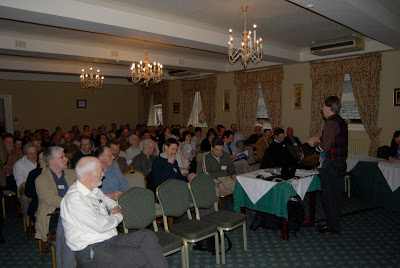Eden Rivers Trust has scooped three awards in the space of a week for its conservation, education and communication work.
The first of these was the Wild Trout Trust and Orvis 2010 Conservation Awards. These Conservation Awards recognise and encourage excellence in the management and conservation of wild trout habitat, celebrating the efforts, skills and ingenuity of projects carried out both by professionals and by grass roots voluntary organisations.
Eden Rivers Trust were the winners of the Professional Category for their Trout Stream Project in the Eden catchment, addressing point source & diffuse pollution, bank-side damage by animal stock, barriers to migration and poor habitat and fish recruitment. This used a wide range of techniques to develop costed and prioritised plans to get the best improvements to habitat for the resources expended.
Judge and Trustee of the Wild Trout Trust, Dr Allan Frake, said, “The competition always attracts habitat management projects at various levels that are carried out by a plethora of differing individuals and organisations. This year’s finalists ranged from those costing hundreds of thousands of pounds to one which virtually cost nothing apart from some oil and petrol for the chain saw! The judges were particularly enthused this year to see projects where a considerable amount of soul searching had gone on to ensure that the work to improve habitat was carefully thought through, evaluated, and decisions based on quality survey data, sound scientific principles and a healthy dose of pragmatism”.
The second award was for Becky Helm, Education Officer for Eden Rivers Trust, in the 2010 Association of Rivers Trusts Awards. These are open to individuals or organisations covering scientific achievement, environmental achievement, volunteer effort or outstanding contribution to the Rivers Trust movement.
Becky Helm won the award for “Outstanding contribution to the Rivers Trust movement” for her role as Education Officer for the past 5 years. In this time she has worked with over 10,000 people including 5500 school children from 50 different schools, 200 adults in higher education, and 5000 members of the general public.
She was instrumental in the successful delivery of Eden Rivers Trust‘s 1.2million Heritage Lottery funded Discover Eden project. She has instigated and implemented many other projects including Rivers Days for schools, the Wetland Discovery Trail, Rivers in the Classroom, the River Rover Mobile Lab, the River Fly Anglers Monitoring Initiative and Mayfly in the Classroom. She has also been involved in community river clean-ups, trainee teacher and work experience placements, local shows, volunteer events and talks for local community groups. All of these have and continue to benefit from her huge enthusiasm, wealth of knowledge and dedicated efforts (including many an evening and weekend). Her skill for successfully combining rivers and the outdoors with education and learning continues to impress.
Becky’s vital work has not only helped to raise awareness about our rivers, and encourage the next generation to learn about their environment and take care of it, but it has also made a huge personal difference to the many people she has worked with. Each year several of the young people Becky first worked with at a school or event have returned to ERT as volunteers.
The third award came from the North West Business Environment Awards, presented at the Bridgewater Hall in Manchester. The Trust was runner-up in the Environmental Champions (Media and Communications) category. This was for its successful communications campaign to raise awareness about the importance and beauty of the River Eden and to conserve and protect the local wildlife, including the endangered white-clawed crayfish.
The judges’ comments on Eden Rivers Trust’s entry included the following:
“The campaign has drawn on a range of different channels to communicate to its target audiences”.
“The active involvement of so many local school children and members of the community in the campaign is to be commended, and as an educational process it has been outstanding”.
“Evidence of a large quantity of sustained, ‘on message’ media coverage, covering the topic from all angles”.
Todd Holden, director of the ENWORKS environmental business support partnership which hosted this year’s awards, said: “The event was a real success and it looks like everyone enjoyed the occasion. I’d like to congratulate our winners and runners-up who are all deserving of widespread recognition and applause for their contribution towards paving the way for a more sustainable future.”
We are delighted to have received all three of these awards, in recognition of the invaluable conservation, education and communication work we carry out regarding the wonderful River Eden. I would like to congratulate and thank all the team at Eden Rivers Trust for their unfailing dedication, professionalism and enthusiasm in all they do. These awards are a justified reflection of their hard work.



































